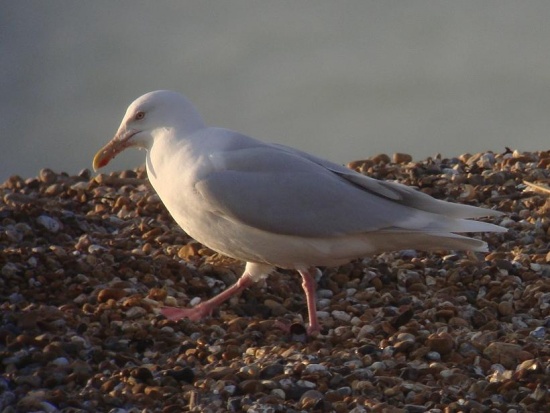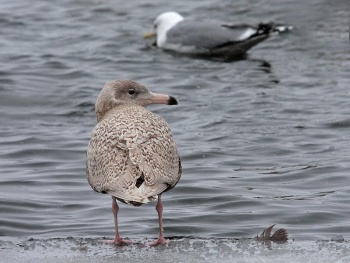- Larus hyperboreus
Identification
64-77 cm (25¼-30¼ in)
A large and powerful gull
Very light in all plumages, lacks black in the wings or tail.
Adults are pale grey above, with a thick yellow bill
Immatures very pale grey with a pink and black bill. They take four years to reach maturity. Notice that the tip of the wings is the palest part of the wing in these.
Similar Species
Has a larger and thicker bill than the Iceland Gull, many are no larger than European Herring Gull but generally size is in between European Herring Gull and Great Black-backed Gull.
Distribution
Breeds in west and north Iceland, Jan Mayen, Bear Island and Svalbard, on the north Russian coast from the Kanin Peninsula eastwards, and on Novaya Zemlya and Franz Josef Land. This species also breeds in Greenland, arctic Canada and Alaska.
In winter found around Iceland and from Lapland south to Denmark and the Netherlands, the north of Scotland and in smaller numbers on the east coast of Britain and northern France. Total British wintering population is usually above 200 birds with up to 600 present in some years. Many are regularly returning individuals with favoured wintering sites. In the New World, winters further south in Canada and the northern U.S.
Vagrant to Spain and the Mediterranean and Black Seas, the Czech Republic, Hungary, the Canary Islands, Azores and Madeira.
Interbreeds extensively with European Herring Gull in Iceland (also recorded in Scotland) and occasionally other species elsewhere in range.
Taxonomy
Subspecies
There are 4 subspecies[1]:
- L. h. hyperboreus:
- Jan Mayen and Spitsbergen east to Taymyr Peninsula
- L. h. pallidissimus:
- Taymyr Peninsula east to Bering Sea and Pribilof Islands
- L. h. barrovianus:
- L. h. leuceretes:
Habitat
Breeds on islands and mainland cliffs, beside freshwater lakes and rivers and on inland crags and cliffs. Out of the breeding season mainly on coasts, often in fishing harbours and bays.
Behaviour
Breeding
They lay their eggs, some time between the middle of May to mid June, depending on snow conditions. Both adults prepare the nest, dropping material (such as grass, twigs, moss and sedges - occasionally seaweed) onto the ground then lying on their breast to push the material with their feet, forming a cup. Further vegetation is added throughout the incubation period. The clutch generally contains 3 eggs.
Diet
Omnivorous like most Larus gulls. Also scavenges as well as seeking suitable small prey. They forage while swimming or walking, and may catch small birds in flight. Often seen following fishing boats.
Vocalisation
Call: a "laughing" cry like a European Herring Gull
Listen to Glaucous Gull voice clip
References
- Clements, J. F., P. C. Rasmussen, T. S. Schulenberg, M. J. Iliff, T. A. Fredericks, J. A. Gerbracht, D. Lepage, A. Spencer, S. M. Billerman, B. L. Sullivan, M. Smith, and C. L. Wood. 2024. The eBird/Clements checklist of Birds of the World: v2024. Downloaded from https://www.birds.cornell.edu/clementschecklist/download/
- Gill, F, D Donsker, and P Rasmussen (Eds). 2024. IOC World Bird List (v 14.2). Doi 10.14344/IOC.ML.14.2. http://www.worldbirdnames.org/
- Burger, J., Gochfeld, M. & Garcia, E.F.J. (2018). Glaucous Gull (Larus hyperboreus). In: del Hoyo, J., Elliott, A., Sargatal, J., Christie, D.A. & de Juana, E. (eds.). Handbook of the Birds of the World Alive. Lynx Edicions, Barcelona. (retrieved from https://www.hbw.com/node/53979 on 20 September 2018).
- Howell, S.N.G. and Dunn, J. (2007) A Reference Guide to the Gulls of the Americas. Peterson Field Guides, New York.
- Malling Olsen, K. & Larsson, H. (2003) Gulls of Europe, Asia and North America. Christopher Helm, London.
- Weiser, E. and H. G. Gilchrist (2012). Glaucous Gull (Larus hyperboreus), version 2.0. In The Birds of North America (A. F. Poole, Editor). Cornell Lab of Ornithology, Ithaca, NY, USA. https://doi.org/10.2173/bna.573
- Weiser, E. and H. G. Gilchrist (2020). Glaucous Gull (Larus hyperboreus), version 1.0. In Birds of the World (S. M. Billerman, Editor). Cornell Lab of Ornithology, Ithaca, NY, USA. https://doi.org/10.2173/bow.glagul.01
Recommended Citation
- BirdForum Opus contributors. (2025) Glaucous Gull. In: BirdForum, the forum for wild birds and birding. Retrieved 16 May 2025 from https://www.birdforum.net/opus/Glaucous_Gull
External Links
GSearch checked for 2020 platform.1







